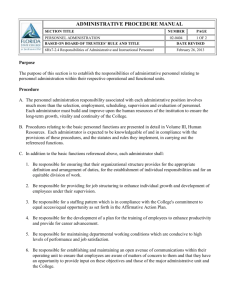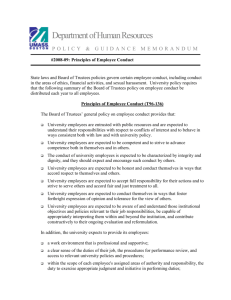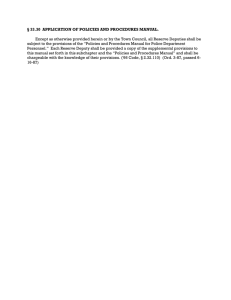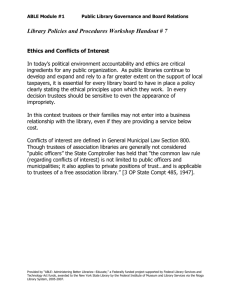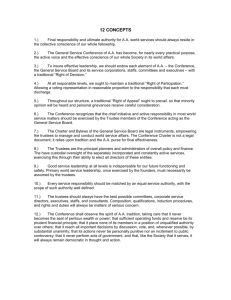Primer for Multiemployer Plan Trustees
advertisement
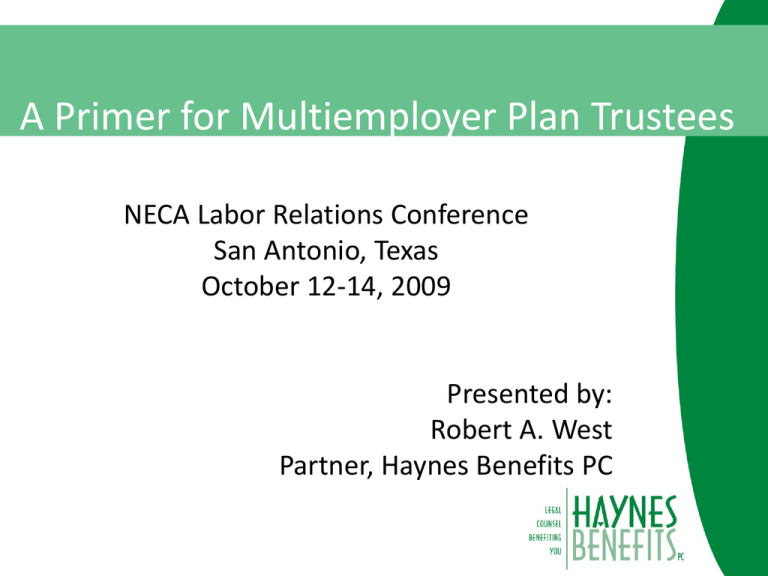
A Primer for Multiemployer Plan Trustees NECA Labor Relations Conference San Antonio, Texas October 12-14, 2009 Presented by: Robert A. West Partner, Haynes Benefits PC Types of Plans Pension Plans Defined benefit plans Defined contribution plans Health Plans Indemnity HMO/PPO HRS HSA/HDHP Joint Apprenticeship and Training Committee Plans (JATC) Plan Formation Legal Entity The Trust is the legal entity (compare a corporation or LLC) The Trust may sue and be sued Governing Body – Board of Trustees Liability – Board of Trustees Plan Formation Governing Documents Trust Document • Compare to a corporation’s bylaws or an LLC’s operating agreement • Who appointed, how appointed (and by whom) and how removed • Meetings, quorums and decisions • Binding arbitration provisions Plan Formation Governing Documents Plan document • Describes the benefits offered by the Plan (and paid from the Trust Fund) – Describes how the amount of the benefits are determined – Defines the form in which the benefits are paid – Provides when benefits are paid • Also defines eligibility and vesting provisions Plan Formation Governing Documents Collective bargaining agreement • Compare to articles of incorporation – the “enabling” document • Specifies rate of contributions Plan Formation Governing Documents Participating Agreement • Binds each employer to the terms and conditions of the Plan and Trust • Only the trustees may change these terms—conditions, changes or exceptions promised by either the local union or NECA chapter are unenforceable Plan Formation NECA and IBEW’s role Implement collective bargaining agreement’s creation of the Plan & Trust Act as “settlors” (creators) of the Trust agreement Negotiate contributions to the Plan Appoint and remove trustees But no authority to bind the trustees or to enter into unilateral agreements with contractors Plan Formation CBA-NECA-IBEW-Trustees-Trust-Plan document CBA authorizes creation of Plan and Trust NECA/IBEW create the Trust fund and appoint trustees Trustees have sole responsibility for, and authority over, the trust fund and the benefits offered under the Plan Plan Formation CBA-NECA-IBEW-Trustees-Trust-Plan document Trust document provides mechanism for trustees to operate the trust fund and authorizes trustees to create the plan Trust fund holds plan assets (contributions and investments) Plan document specifies benefits – eligibility, vesting and distributions Applicable Laws and Enforcement Agencies ERISA – U.S. Department of Labor (DOL) and Pension Benefit Guaranty Corporation (PBGC) Internal Revenue Code – Internal Revenue Service Taft-Hartley Ancillary Laws Applicable Laws and Enforcement Agencies Ancillary Laws Health Insurance Portability and Accountability Act (HIPAA) – U.S. Department of Health & Human Services Family Medical Leave Act (FMLA) – DOL Americans with Disabilities Act (ADA) – Equal Employment Opportunity Commission (EEOC) Title VII – EEOC Applicable Laws and Enforcement Agencies Ancillary Laws Uniformed Services Employment and Reemployment Rights Act of 1994 (USERRA) – DOL Pension Protection Act of 2006 (PPA) Heroes Earnings Assistance and Relief Act of 2008 (HEART Act) Taft Hartley Mandates that any payments made by an employer for employee benefits under a multi-employer plan must meeting the following rules: Contributions must be made into a trust for the sole benefit of employees The trust must be jointly trusteed by an equal number of management and labor representatives The trust agreement must provide a binding arbitration mechanism Taft Hartley What Taft Hartley does and does not provide: It enables labor organizations and management representatives to create employee benefit plans for the benefit of organized labor (and provides the general framework in which those benefits must be provided – i.e., a trust, jointly trusteed, and mandatory arbitration) Taft Hartley What Taft Hartley does and does not provide: Taft Hartley does not specify fiduciary requirements or coverage, vesting, nondiscrimination or funding requirements – these provisions are dictated by ERISA and the Internal Revenue Code ERISA (Employee Retirement Income Security Act of 1974) ERISA provisions applicable to all Taft Hartley pension and welfare benefit plans Covered by federal law Federal law preempts any state law provisions Right to sue and be sued Fiduciary duties Prohibited transactions* *Internal Revenue Code has similar provisions ERISA (Employee Retirement Income Security Act of 1974) ERISA provisions applicable to all Taft Hartley pension and welfare benefit plans Participant communications (Summary Plan Description and other required participant notices) Claims procedures Governmental reporting obligations (Form 5500)* *Internal Revenue Code has similar provisions ERISA (Employee Retirement Income Security Act of 1974) ERISA provisions applicable to all Taft Hartley pension and welfare benefit plans Obligation to collect employer contributions Trust fund/plan assets Bonding obligations ERISA (Employee Retirement Income Security Act of 1974) ERISA provisions applicable to pension plans only Eligibility* Vesting* Pension Benefit Guaranty Corporation provisions Funding obligations* Withdrawal liability QDROs* *Internal Revenue Code has similar provisions ERISA (Employee Retirement Income Security Act of 1974) ERISA provisions applicable to health plans only COBRA (continuation of health care benefits)* Qualified Medical Child Support Orders Health Insurance Portability and Accountability Act (special enrollment rules and eligibility and benefit nondiscrimination rules) *Internal Revenue Code has similar provisions Internal Revenue Code (“I.R.C.”) IRC Provisions applicable to all Taft Hartley pension and health and welfare plans Non-taxability of trust earnings (VEBA) Deductibility of employer contributions Eligibility requirements † Non-discrimination requirements (“highly compensated” versus “non-highly compensated” employees) Prohibited transactions† Governmental reporting obligations† †ERISA has similar provisions Internal Revenue Code (“I.R.C.”) IRC Provisions applicable to all pension plans Vesting† Funding† Pre-tax employee elective contributions (401(k) only) Benefit limitations †ERISA has similar provisions Internal Revenue Code (“I.R.C.”) IRC Provisions applicable to all pension plans Qualified Joint and Survivor Annuity requirements Required Minimum Distributions and distribution restrictions Rollover rules Internal Revenue Code (“I.R.C.”) IRC Provisions applicable to health and welfare plans COBRA† Non-taxation of benefits received Non-taxation of value of premium paid by employer Cafeteria plan rules (Section 125) for pretax treatment of employee contributions †ERISA has similar provisions Other Applicable Laws Pension Plans ADEA (age discrimination) USERRA (military service) HEART Act (military service) Other Applicable Laws Health Plans HIPAA Portability (special enrollment) HIPAA Non-discrimination (benefits) HIPAA Privacy (non-disclosure of personal health information) HIPAA Security (electronic security procedures) Americans with Disabilities Act (disability discrimination) Other Applicable Laws Health Plans Title VII (maternity/gender discrimination) Family Medical Leave Act (medical leave) USERRA (military service leave) Mental Health Parity Medicare Womens Health and Cancer Rights Act Newborn and Mothers Health Protection Act Wellstone Act Critical Documents All Plans Trust Agreement Plan document Participation agreement Collection policy Investment policy Reciprocal agreements Summary Plan Description Critical Documents All Plans Service provider agreements (such as third party administrator, investment managers and other providers) Fidelity bond Fiduciary liability Insurance (including a non-recourse policy purchased by the individual trustee or by the Chapter) Critical Documents Pension Plans QDRO procedures Loan procedures (401(k)) Critical Documents Health and Welfare Plans COBRA procedures and notices FMLA procedures Qualified Medical Child Support Order procedure Reinsurance (or stop loss) policy HIPAA Privacy policy and procedures HIPAA Security policy and procedures The Players and their Roles Trustees The Plan fiduciaries Sole authority and responsibility for defining benefits, calculating required contributions, collecting contributions, investing Plan assets (or selecting an investment manager), selecting other professional advisors, managing the Plan and making benefit determinations The Players and their Roles Trustees If any responsibility has been delegated, duty to monitor the performance of the professional to whom the delegation has been given The Players and their Roles NECA-IBEW Agree in the CBA to establish a plan of benefits and trust Create the original trust agreement (“settlors” of the trust) May reserve authority to amend the trust agreement Appoint trustees and their successors The Players and their Roles NECA-IBEW Neither organization may agree to (i) special conditions for individual employers (e.g., agreeing to special contribution exclusions outside the labor agreement); or (ii) specified benefits for employees. Only the trustees have this authority The Players and their Roles NECA-IBEW If either organization asserts authority (or neglects trustee appointment or removal authority), the organization may become a fiduciary The Players and their Roles Third party administrator Handles the day to day administration of the Plan Includes collecting contributions, processing QDROs, making benefit payments, etc. No independent authority The Players and their Roles Actuary/consultant Assists trustees in defining benefits Determines the funding costs and funding requirements for those benefits May provide Plan documents No independent authority The Players and their Roles Investment Manager Invests Plan assets and selects investment choices (pursuant to an investment policy) Has independent authority and fiduciary responsibility for this responsibility (but trustees remain liable for due diligence in selection, performance, retention of the investment manager) The Players and their Roles Investment Monitor Assists trustees in oversight of Investment Manager (and monitors investment manager’s performance against financial industry benchmarks). No independent authority The Players and their Roles Attorney Advises the trustees as to legal requirements under ERISA, the Code and general fiduciary responsibilities Drafts and reviews Plan documents and procedures Drafts/reviews provider agreements, insurance policies, etc. Advises trustees concerning collection actions and brings such actions The Players and their Roles CPA Performs the annual audit A Trustee’s Eleven Commandments Do not deal with the assets of the Plan in one’s own interest (e.g., arranging interim financing for a favorite general contractor). Read and follow the terms of the trust agreement Read and follow the terms of the Plan Insure the Plan is properly funded A Trustee’s Eleven Commandments Do not take instructions from the business manager (or the Chapter manager) Invest prudently and utilize due diligence in selecting investment managers Engage an investment monitor Exercise due diligence in selecting/retaining Plan consultants, administrators and legal counsel A Trustee’s Eleven Commandments Accept guidance from the professional advisors you have selected (or replace them or obtain second opinions) Collect unpaid contributions Make certain that fiduciary liability policy premiums are paid Q&A
